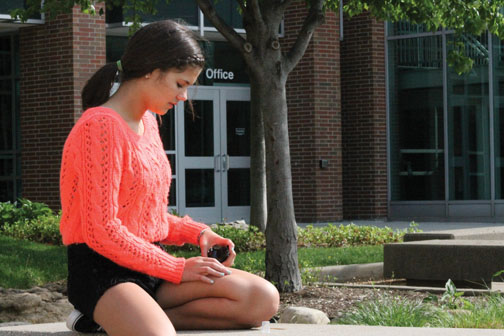
Earlier this year on March 22, Gov. Mike Pence passed a bill to take effect this summer banning minors under the age of 16 from using tanning beds at salons; however, those under the age of 18 are still permitted to tan with parental permission.
According to sophomore Sophie Page, who said she has used a tanning bed before, the ban was a smart decision for multiple reasons.
“It (was) a good idea because if you (tan) too much, younger people aren’t old enough to even understand how dangerous tanning beds can be,” Page said.
Freshman Center nurse Julie Beihold said she agrees with Page and said the bill was probably passed to reduce the risks of skin cancer. However, she said there is no particular reason the ban is for minors under the age of 16. So, according to Beihold, the ban should also be extended to people under the age of 18.
“I don’t think tanning beds have a greater effect on younger people. I think anyone can burn, anyone can get damage from the sun, but a younger person might not be as aware because of lack of experience,” Beihold said. “If they are getting burned, they might not know how serious a burn can be down the road like if it turns into blistering because they haven’t dealt with that before. They might not be as aware of, ‘OK, I’m burning; I’m starting to feel this,’ as an older person might, so (the ban) should probably be extended to children who are under 18, until they can make their own decisions.”
Beihold also said tanning while laying out in the sun can be as dangerous as using a tanning bed.
She said, “I think the risks of using a tanning bed or laying out in the sun (are) the same, except maybe people are misinformed that they think (laying out in the sun) is safer, which it isn’t,” Beihold said. “Technically, you should probably wear sunscreen anytime you’re in the sun if you really want to (tan) the right way, but I don’t think that’s better (than using a tanning bed). Either way, deliberately getting a tan is not a good idea.”
Beihold said, however, that there are many safer alternatives to the use of tanning beds or laying out in the sun, and that students should use these instead.
“Well, hopefully we don’t have that many students that are tanning, but there are all kinds of great alternatives now to tanning now (such as) bronzing gels (and) sprays,” Beihold said.
 According to Page many students at CHS might be negatively affected by this ban due to their dependence on tanning beds for many extracurricular activities.
According to Page many students at CHS might be negatively affected by this ban due to their dependence on tanning beds for many extracurricular activities.
“I think students will be affected because now it’s so common and easy to go lay in a tanning bed for ten minutes and look ‘better’ in a choir concert, prom dress, et cetera,” Page said.
However, she also said some students like herself will not be affected because the tanning bed ban only applies to minors who try to go tanning in a salon.
“I will not be affected as much by the ban because I typically don’t use tanning (beds), but also because I have a tanning bed in my house,” Page said.
Beihold, on the other hand, disagrees with Page that students may be negatively affected by the ban and said she thinks the ban will be beneficial for students.
“Hopefully (the ban) will just make (students) more aware of the risks associated with sun damage and UVA/UVB damage and get them more aware of taking care of their skin as part of overall health because (tanning) is not separate,” Beihold said. “You tend to think ‘OK, I eat well, I exercise, but I like to be sun tanned,’ so you just have to look at the whole aspect of health altogether, and (tanning) is part of it so it shouldn’t be left out.”

































![AI in films like "The Brutalist" is convenient, but shouldn’t take priority [opinion]](https://hilite.org/wp-content/uploads/2025/02/catherine-cover-1200x471.jpg)









































![Review: “The Immortal Soul Salvage Yard:” A criminally underrated poetry collection [MUSE]](https://hilite.org/wp-content/uploads/2025/03/71cju6TvqmL._AC_UF10001000_QL80_.jpg)
![Review: "Dog Man" is Unapologetically Chaotic [MUSE]](https://hilite.org/wp-content/uploads/2025/03/dogman-1200x700.jpg)
![Review: "Ne Zha 2": The WeChat family reunion I didn’t know I needed [MUSE]](https://hilite.org/wp-content/uploads/2025/03/unnamed-4.png)
![Review in Print: Maripaz Villar brings a delightfully unique style to the world of WEBTOON [MUSE]](https://hilite.org/wp-content/uploads/2023/12/maripazcover-1200x960.jpg)
![Review: “The Sword of Kaigen” is a masterpiece [MUSE]](https://hilite.org/wp-content/uploads/2023/11/Screenshot-2023-11-26-201051.png)
![Review: Gateron Oil Kings, great linear switches, okay price [MUSE]](https://hilite.org/wp-content/uploads/2023/11/Screenshot-2023-11-26-200553.png)
![Review: “A Haunting in Venice” is a significant improvement from other Agatha Christie adaptations [MUSE]](https://hilite.org/wp-content/uploads/2023/11/e7ee2938a6d422669771bce6d8088521.jpg)
![Review: A Thanksgiving story from elementary school, still just as interesting [MUSE]](https://hilite.org/wp-content/uploads/2023/11/Screenshot-2023-11-26-195514-987x1200.png)
![Review: "When I Fly Towards You", cute, uplifting youth drama [MUSE]](https://hilite.org/wp-content/uploads/2023/09/When-I-Fly-Towards-You-Chinese-drama.png)
![Postcards from Muse: Hawaii Travel Diary [MUSE]](https://hilite.org/wp-content/uploads/2023/09/My-project-1-1200x1200.jpg)
![Review: "Ladybug & Cat Noir: The Movie," departure from original show [MUSE]](https://hilite.org/wp-content/uploads/2023/09/Ladybug__Cat_Noir_-_The_Movie_poster.jpg)
![Review in Print: "Hidden Love" is the cute, uplifting drama everyone needs [MUSE]](https://hilite.org/wp-content/uploads/2023/09/hiddenlovecover-e1693597208225-1030x1200.png)
![Review in Print: "Heartstopper" is the heartwarming queer romance we all need [MUSE]](https://hilite.org/wp-content/uploads/2023/08/museheartstoppercover-1200x654.png)




